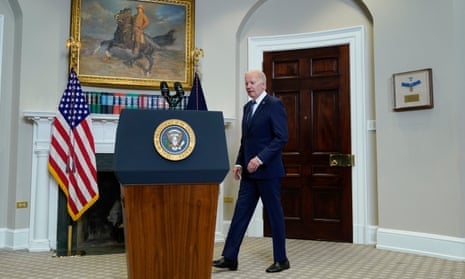Good morning.
Joe Biden has said a bipartisan deal to raise the $31.4tn US debt ceiling and avoid a default is ready to move to Congress and urged lawmakers to pass the agreement he struck with Kevin McCarthy, the leader of the Republican-majority House.
To reduce spending, as Republicans had insisted, the package includes a two-year budget deal that would hold spending flat for 2024 and impose limits for 2025. That’s in exchange for raising the debt limit for two years, until after the next election.
But McCarthy’s far-right wing members are expected to balk at spending cuts that they deem not deep enough, while progressives may be more likely to choke down cuts and benefits restrictions that they loathe in order to pass the deal.
Yesterday, McCarthy boasted on Fox News that “there’s not one thing in the bill for Democrats” even though Biden achieved his fundamental goal of persuading the Republican to agree to a debt ceiling increase. McCarthy predicted House GOP members will support the deal.
“A deal that’s good news for the American people.” Biden hailed the agreement last night. “It takes the threat of catastrophic default off the table, protects our hard-earned and historic economic recovery,” he said.
Recep Tayyip Erdoğan wins Turkish presidential election
Recep Tayyip Erdoğan has extended his two decades in power, securing victory over his rival Kemal Kılıçdaroğlu after an unprecedented presidential runoff election, in a vote that reflected Turkey’s stark and persistent political polarisation.
With 99.43% of the vote counted, Turkey’s supreme election authority announced late on Sunday that Erdoğan had won 52.14% of the votes, more than 2m more than his opponent, who received 47.86%. Even before the result was called, a triumphant Erdoğan stood on top of a bus near his residence in Istanbul to once again sing a campaign song to his adherents and pronounce victory.
“Look at this scene. It’s magnificent,” he said. “We have completed the second round of the presidential elections with the favour of our nation … Elections come and go, the flood goes away but the sand remains. The main thing is that our country does not deviate from its goals, and our nation takes care to remain united. This is the biggest message of today’s elections.”
The victory for Turkey’s longest-serving leader affords him another term in office as president and an endorsement of his populist style of politics after he emerged victorious in an election that challenged his rule.
Two decades in office. The Turkish leader has reshaped the country in his own image, concentrating power on his office, detaining opponents and instituting increasingly unorthodox economic policies. Despite this, he gained support in many of the areas of Turkey worst hit by the country’s financial troubles.
Vacant skyscrapers, empty trains: can San Francisco once again reinvent itself?

A newly built hub that was announced with great fanfare before the pandemic was supposed to ferry workers in from all over the region to downtown San Francisco. But it remains quiet, save for the metaphorical tumbleweeds. The city’s main public transport systems are collapsing under the weight of their own emptiness.
The number of riders on the Bart system is about 30% of pre-pandemic levels for riders who exit in downtown San Francisco. Without a $5bn bailout, service cuts to some of the city’s transit lines could start as soon as this summer, writes Isabeau Doucet.
Once home to some of the most expensive and sought-after office space in the world, San Francisco today is suffering from one of the most hollowed-out downtowns in North America. The emptiness has made some of the city’s other problems – an enduring homelessness emergency, open-air drug use in some neighborhoods and high rates of property crime – seem more visible.
But part of the solution may lie in downtown’s emptiness. With high-rises full of empty office space, many artists and low- and middle-income residents priced out, and the most disadvantaged residents of the city housing themselves on its sidewalks, could this vacancy crisis be an opportunity to tackle this emergency in housing and homelessness?
Working from home. A study comparing mobile phone data across 62 downtowns in North America found that San Francisco’s recovery was dead last, with only 31% of the activity it had pre-pandemic.
In other news …
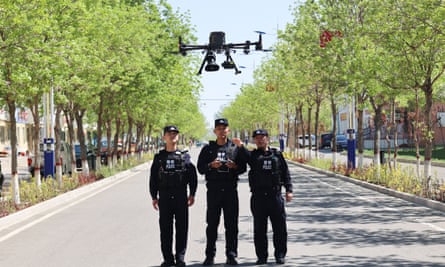
Chinese courts prosecuted 8.3 million people in the five years to 2022, a 12% increase on the previous period. There was also a nearly 20% increase in the number of protests against court rulings. The figures give a glimpse of how China’s notoriously opaque justice system has operated in recent years, amid a tightening domestic security environment.
Abd al-Rahim al-Nashiri, a Guantánamo Bay prisoner tortured by the CIA after being alleged by the US to have plotted al-Qaida’s bombing of an American naval ship, has accused British intelligence agencies of complicity in his mistreatment in a case before one of UK’s most secretive courts.
Japan’s military has said it will destroy any North Korean missile that violates its territory and is making preparations to do so, after Kim Jong-un’s regime told Tokyo it planned to launch what could be its first military satellite, which would enhance the country’s surveillance capability and improve its ability to strike targets in the event of war, between 31 May and 11 June.
Stat of the day: Up to 70% of California beaches could disappear by end of the century
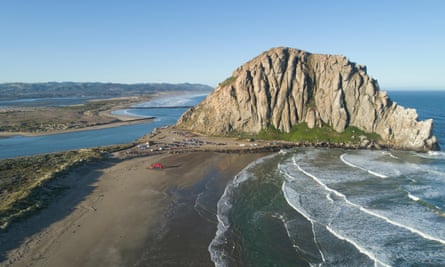
California is known for golden sands and endless waves, but much of the state’s shoreline could vanish in the future. That’s according to a new study, which is yet to be peer-reviewed but echoes the findings of a previous investigation. It found that between 25% and 70% of California beaches might be washed away by the end of the century, leaving only cliffs or coastal infrastructure in their wake. The California Coastal Commission is already encouraging cities to harden their coastline by building seawalls or depositing large rocks that can help protect them from pounding waves, though sea walls can cause sand to erode faster from adjacent beaches.
“Beaches are perhaps the most iconic feature of California, and the potential for losing this identity is real,” wrote Sean Vitousek, the researcher who led the study. “Losing the protecting swath of beach sand between us and the pounding surf exposes critical infrastructure, businesses and homes to damage. Beaches are natural resources, and it is likely that human-management efforts must increase in order to preserve them.”
Don’t miss this: Wave of lawsuits against US gun makers raises hope of end to mass shootings
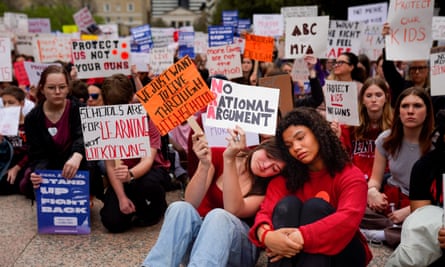
In New York, California, Delaware and other states, new laws aim to provide ways around a near 20-year immunity provided to gun manufacturers and distributors. In Indiana, a lawsuit brought by victims of the 2021 mass shooting at a FedEx facility aims to hold a gun manufacturer accountable for the horror wrought by one of its weapons. The emerging wave of lawsuits against gun makers echoes previous successes against the car industry, opioid companies and big tobacco, writes Adam Gabbatt. Huge financial penalties led companies to acknowledge the danger of their products and pushed them toward more responsible practices.
The door was effectively opened for gun litigation last year, when the families of five adults and four children killed in the 2012 Sandy Hook school shooting settled with Remington, which manufactured the AR-15 style rifle used in the massacre, for $73m. Other lawsuits like the Indianapolis action, brought by two survivors of the shooting and the family of a man killed, broadly argue that gun manufacturers, gun sellers and gun distributors bear responsibility for gun crimes because of the way they design, market and distribute their products and there is evidence the litigation could work to combat gun violence.
… or this: Niger’s cycle of deadly violence raises questions over US counter-terror role

When is a western security assistance deployment truly a success story? Niger, where jihadist groups have killed thousands in recent years, has been the largest recipient of state department military aid in west Africa and the second-largest in sub-Saharan Africa since 2002. The number of US personnel deployed to Niger has also jumped from 100 to 1,001 over the past 10 years. The US has also built a number of military or CIA outposts, including several bases to launch armed drones.
But Elizabeth Shackelford, a former US state department foreign service officer who served in several posts in Africa, said that the steep rise in violent events in Niger – 43% over the past year – meant that hard questions must be asked. “At a minimum, more US security assistance isn’t leading to more security, and all signs suggest it plays a role in making matters worse,” she said. The US state department, making a mockery of the praise a US commander recently showered upon the Nigerien armed forces, recently said there had been numerous reports of arbitrary or unlawful executions by authorities or their agents.
Climate check: Alberta’s party leaders are ignoring the climate crisis while the region burns
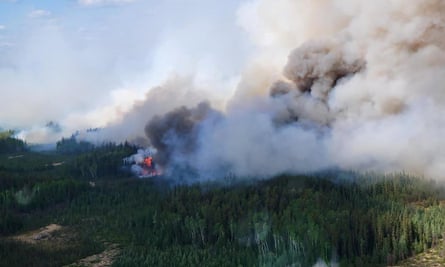
Record-breaking wildfires have charred more than a million hectares of land in Alberta, pushing tens of thousands from their homes and choking the skies in a thick haze of smoke. But on the zigzagging campaign trail of the Canadian province’s general election, neither party leader has confronted the realities of climate change and how it will likely dramatically reshape life in the Canadian prairies.
Instead, they’ve spent weeks sparring over taxation, healthcare – and one candidate’s deeply offensive remarks about transgender children. By all accounts, Alberta’s election on Monday is going to be a political nail-biter, a bitterly contested campaign filled with fears of party mutiny, allegations of judicial interference and an unprecedented political comeback. But for all the excitement of the race, political scientists are baffled that leaders have repeatedly shied away from confronting the realities of global heating.
Last Thing: Inside the world’s longest-running mermaid gathering: ‘The first place I’ve truly belonged’

Hundreds gathered last weekend for the California Mermaid Convention: a three-day celebration of the increasingly popular practice of “mermaiding”. Part cosplay, part athletic endeavor, the hobby ranges from casual dress-up to certified divers who strap on “monofins” and swim together in a pool or the open ocean, writes Kari Paul. Above all, mermaids are an inclusive community working to maintain its magic as participation grows, thanks in part to easily accessible fins and excitement about Disney’s reboot of The Little Mermaid.
Chè Monique, a mermaid based in the DC area, founded the Society of Fat Mermaids in 2018 and was drawn to a community where she said she always felt celebrated. She found the whimsical nature of mermaiding lends itself to expansive representations of many identities – and a desire to keep the space as safe as possible. “The mer-community is ultimately made up of adults doing very playful, creative stuff,” she said. “You’re already letting your personal vulnerability show, and letting your weird out, so it makes sense to want to protect your larger community,” she said.
Sign up
First Thing is delivered to thousands of inboxes every weekday. If you’re not already signed up, subscribe now.
Get in touch
If you have any questions or comments about any of our newsletters please email newsletters@theguardian.com
